Eps-Topik Book In English Chapter-06
저는 투안입니다
My name is Tuan
The following is a dialogue between Minsu and Tuan. They are introducing themselves to each other. First, listen to the dialogue twice and repeat.
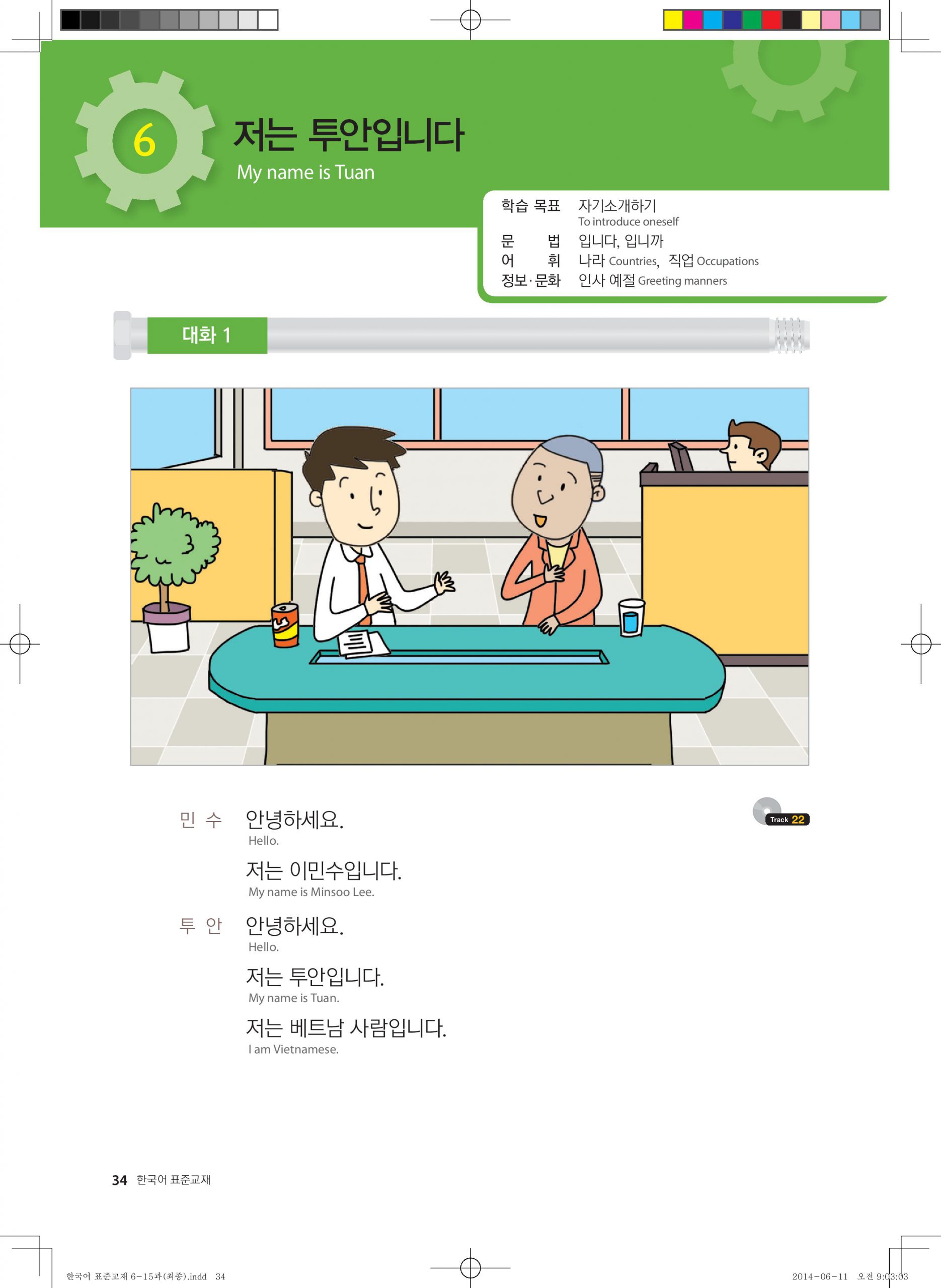
저는 투안입니다 My name is Tuan
학습 목표 : 자기소개하기 To introduce oneself
문 법 : 입니다, 입니까
어 휘 : 나라 Countries, 직업 Occupations
정보 문화 : 인사 예절 Greeting manners
대화 1
민 수 : 안녕하세요. Hello. 저는 이민수입니다. My name is Minsoo Lee.
투 안 : 안녕하세요. Hello.
저는 투안입니다. My name is Tuan.
저는 베트남 사람입니다. I am Vietnamese.
저 I
Used to refer to oneself in a humble manner
ㆍ 저는 이영진 입니나.
i am Lee Yeongjin.
저는 필리핀 사람 입니다.
i am a Fililpino.
안녕하세요 Hello
Used as a greeting when meeting
someone
ㆍ 안녕하세요. 저는 이민수 입니다.
Hello. i am Lee Minsu.
ㆍ 안녕하세요. 만나서 반 갑 습니다
Hello. Nice to meet you.
Did you listen carefully and repeat? Then answer the following questions.
투안씨는 누구 와 인사를 했어요? who did tuan say hello to?
투안씨는 어느 나라 사람입니까? what is Tuan’s nationality?
The following flags are those of the countries of people that come to Korea to work. Do you want to know which country each flag belongs to?
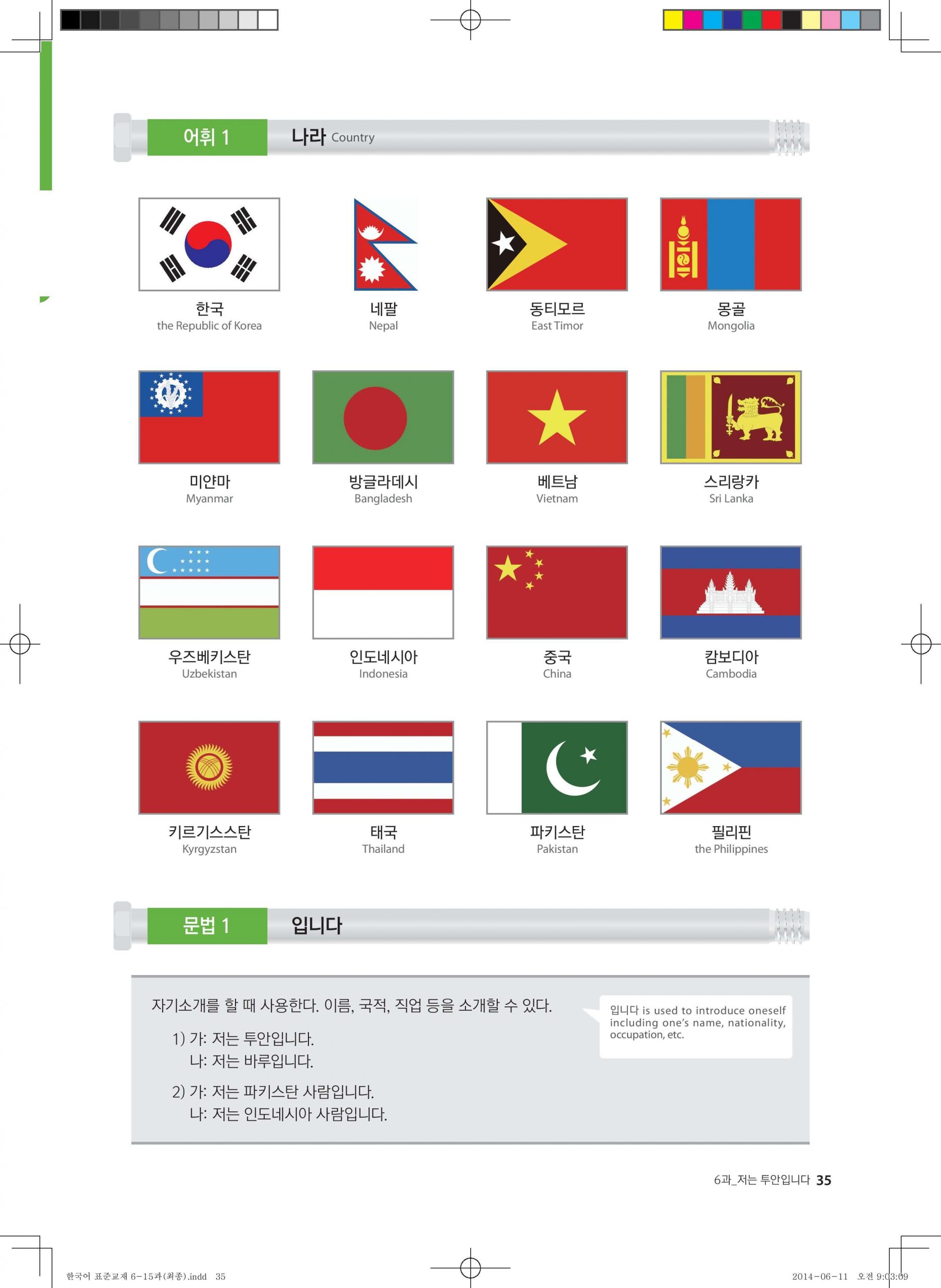
Tips
In English the verb ‘to be’ changes to ‘am’, ‘are’ or ‘is’ depending on the person in the subject. In Korean ‘- 입 니다 is always used regardless of the grammatical person. In addition, the word order in English changes in questions while in Korean the verb itself is conjugated. Thus, ‘입 니다 is used in declarative and ‘-임니까’ in interrogative sentences.
어휘 1 나라 Country
한국 – the Republic of Korea
네팔 – Nepal
동티모르 – East Timor
몽골 – Mongolia
미얀마 – Myanmar
방글라데시 – Bangladesh
베트남 – Vietnam
스리랑카 – SriLanka
우즈베키스탄 – Kyrgyzstan
태국 – Thailand
파키스탄 – Pakistan
필리핀 – the Philippines
문법 1 ‘입니다‘
자기소개를 할 때 사용한다. 이름, 국적, 직업 등을 소개할 수 있다.
입니다 is used to introduce oneself
including one’s name, nationality,
occupation, etc.
1) 가: 저는 투안입니다.
나: 저는 바루입니다.
2) 가: 저는 파키스탄 사람입니다.
나: 저는 인도네시아 사람입니다
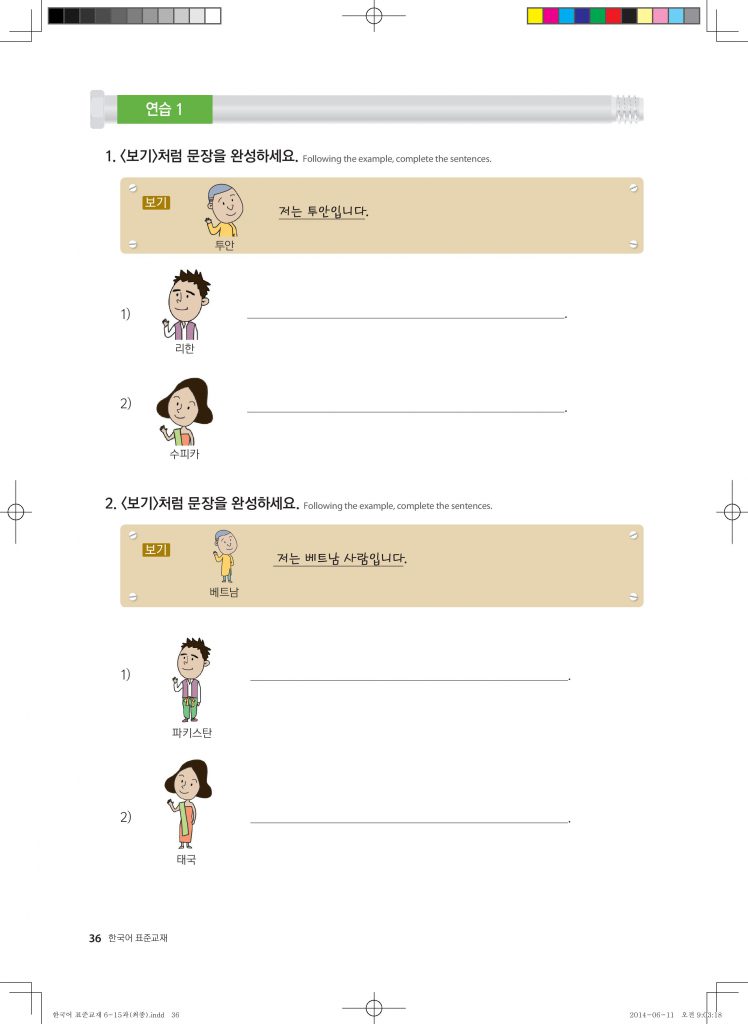
연습 1 Answer
1.
1) 저는 리한입니다.
2) 저는 수피카입니다.
2.
1) 저는 파키스탄 사람입니다.
2) 저는 태국 사람입니다.
Tuan and Jungu are introducing themselves. And they are talking about their nationality and occupations. Where did they come from? First, listen carefully to the dialogue twice.
Track 23
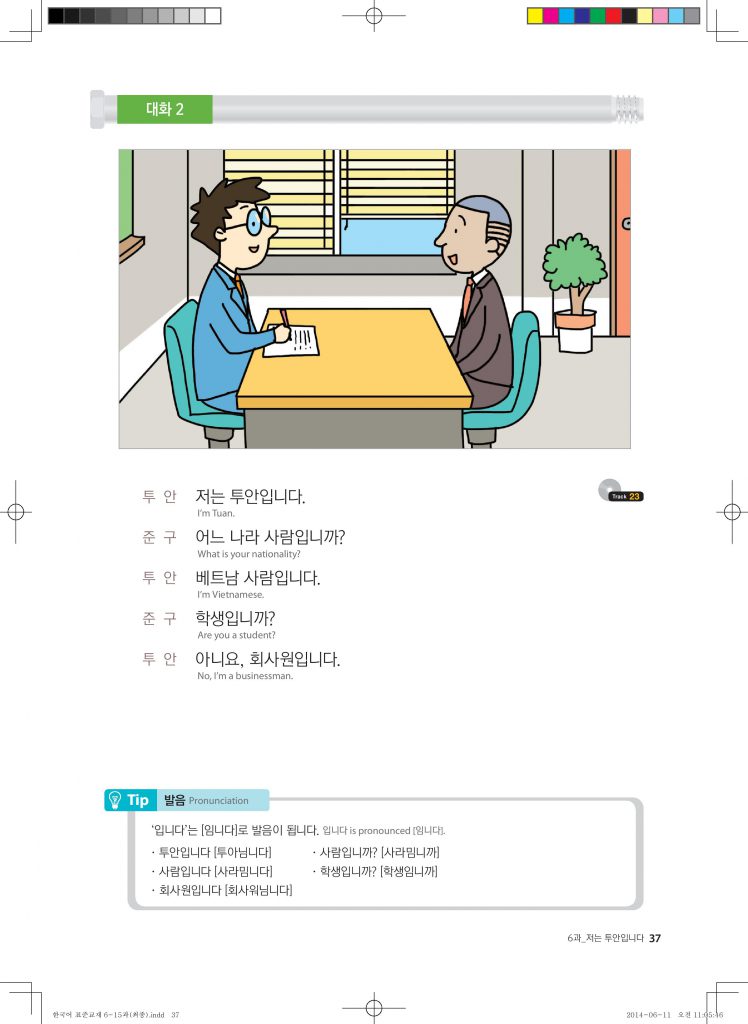
대화 2
투 안 : 저는 투안입니다. I’m Tuan.
준 구 : 어느 나라 사람입니까? What is your nationality?
투 안 : 베트남 사람입니다. I’m Vietnamese.
준 구 : 학생입니까? Are you a student?
투 안 : 아니요, 회사원입니다. No, I’m a businessman.
어느 which
Used to ask about a specific object among many others
가: 어느 나라 사 람 입니까?
Which country do you come from?
나: 필리핀 사 람 입니다.
i come from philippines.
아니요 no Used for negation
‘네’ is used for affirmation
가: 한국 사람 입니까?
Are you Korean?
나: 아니요, 베트남 사람 입니다.
No, i am Vietnamese.
This time, please suppose that you are Tuan and Jungu, and then repeat the dialogue. Did you listen carefully and repeat? Answer the following questions.
1.투안 씨는 어느 나라 사람이에요? which country does Tuan come from?
2.투안 씨의 직업은 뭐예요? what is Tuan’s occupation?
Tip ‘발음 Pronunciation‘
‘입니다’는 [임니다]로 발음이 됩니다. 입니다 is pronounced [임니다].
· 투안입니다 [투아님니다]
· 사람입니다 [사라밈니다]
· 회사원입니다 [회사워님니다]
· 학생입니까? [학생임니까]
· 사람입니까? [사라밈니까]
Let’s study words about occupations
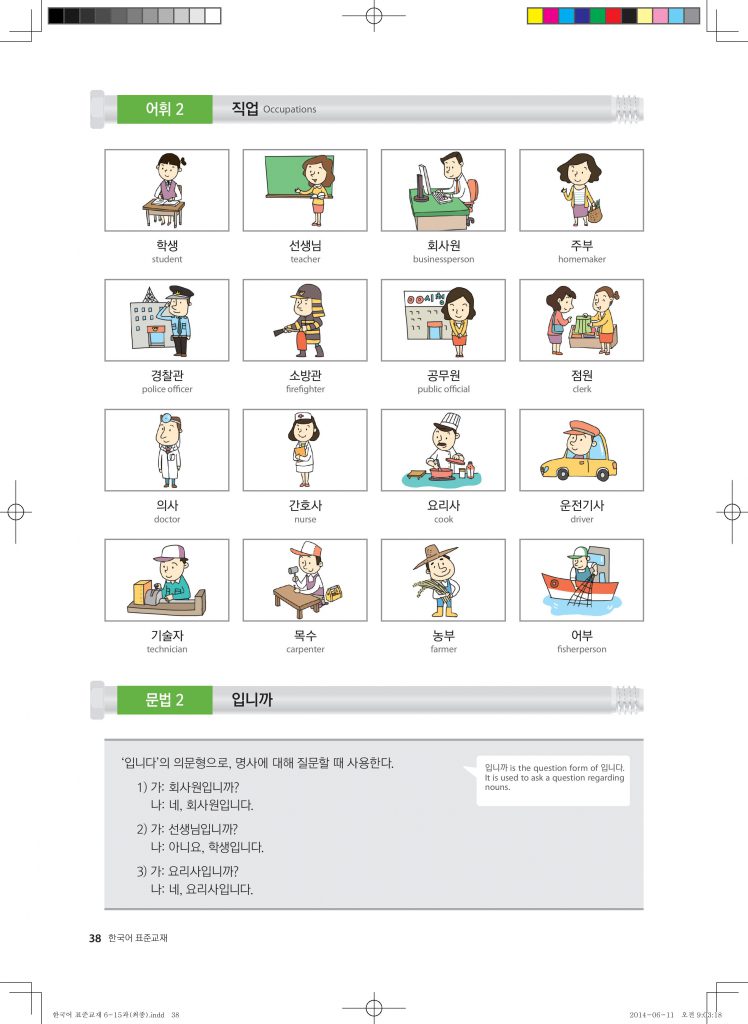
어휘 2 ‘직업 Occupations‘
학생 student
선생님 teacher
회사원 businessperson
주부 homemaker
경찰관 police officer
소방관 firefighter
공무원 public official
점원 clerk
의사 doctor
간호사 nurse
요리사 cook
운전기사 driver
기술자 technician
목수 carpenter
농부 farmer
어부 fisherperson
문법 2 ‘입니까‘
‘입니다’의 의문형으로, 명사에 대해 질문할 때 사용한다.
입니까 is the question form of 입니다.
It is used to ask a question regarding
nouns.
1) 가: 회사원입니까?
나: 네, 회사원입니다.
2) 가: 선생님입니까?
나: 아니요, 학생입니다.
3) 가: 요리사입니까?
나: 네, 요리사입니다.
Think again about the vocabulary you learned above and answer the question.
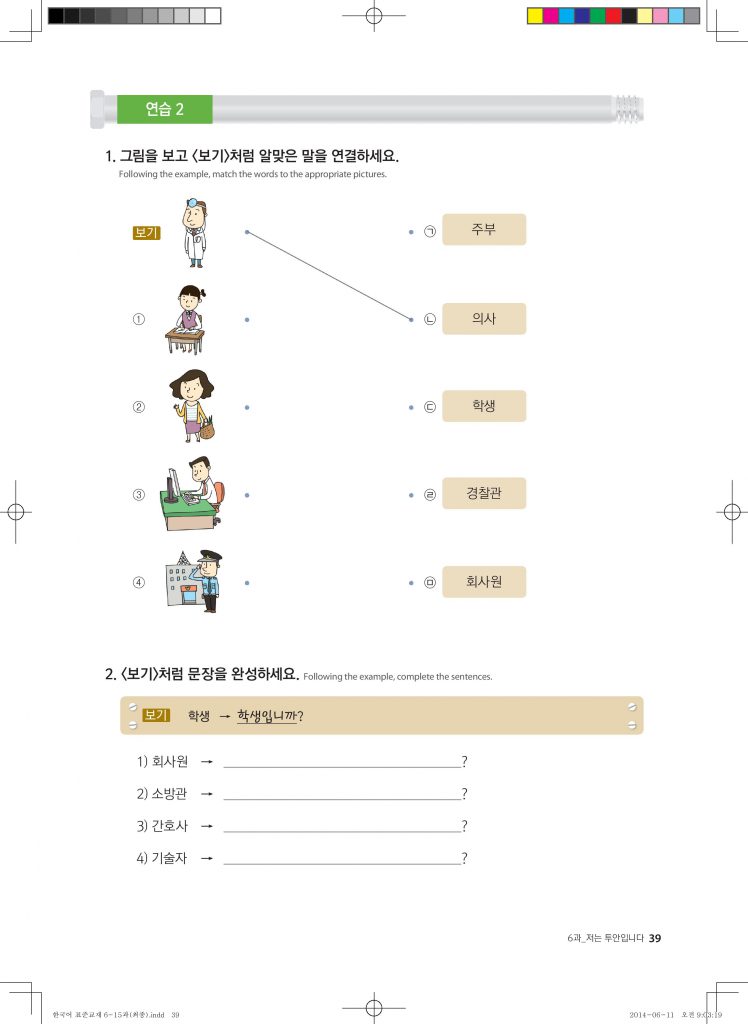
연습 2
1.
①-㉢, ②-㉠, ③-㉤, ④-㉣
2.
1) 회사원입니까?
2) 소방관입니까?
3) 간호사입니까?
4) 기술자입니까?
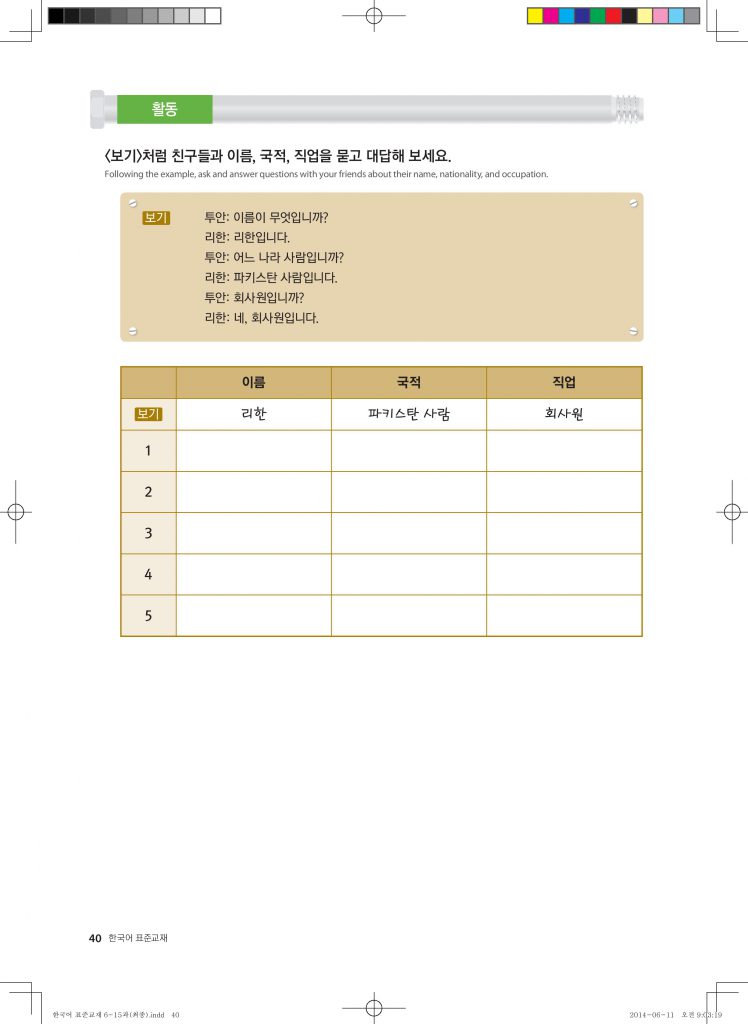
보기
투안: 이름이 무엇입니까?
리한: 리한입니다.
투안: 어느 나라 사람입니까?
리한: 파키스탄 사람입니다.
투안: 회사원입니까?
리한: 네, 회사원입니다.
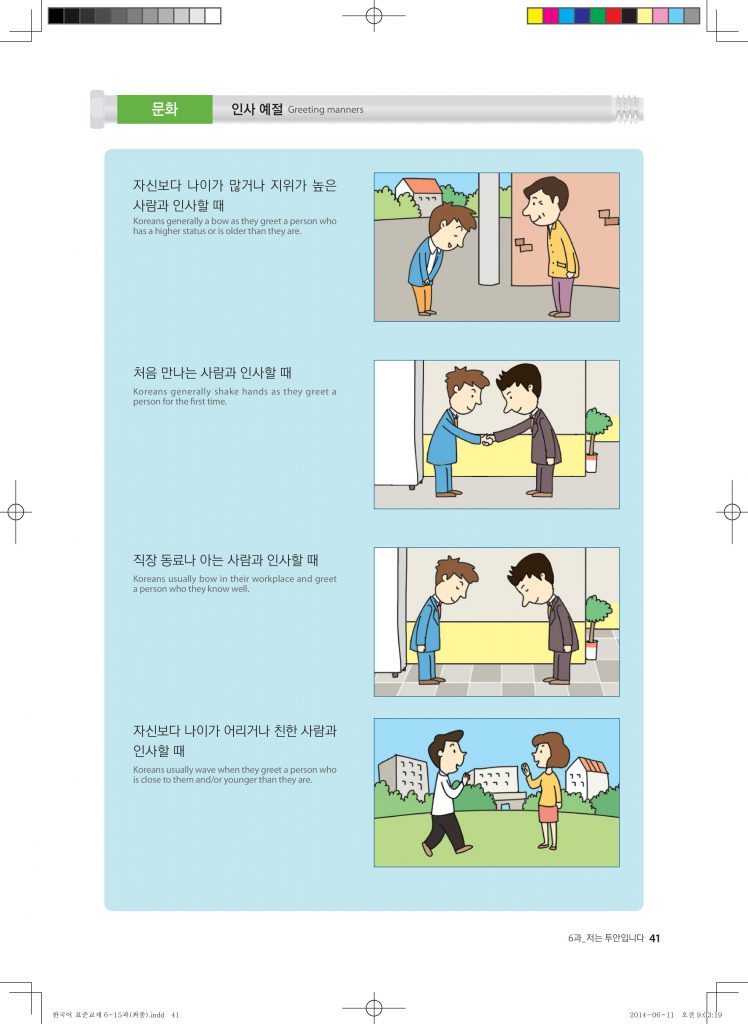
인사 예절 Greeting manners
자신보다 나이가 많거나 지위가 높은 사람과 인사할 때
Koreans usually have a bow when they greet a person who is in a higher position or older than themselves.
처음 만나는 사람과 인사할 때
Koreans generally shake hands When you greet the first person you meet.
직장 동료나 아는 사람과 인사할 때 Koreans usually bow When greeting a colleague or someone you know
자신보다 나이가 어리거나 친한 사람과 인사할 때
Koreans usually wave When greeting someone close to you who is younger than you.
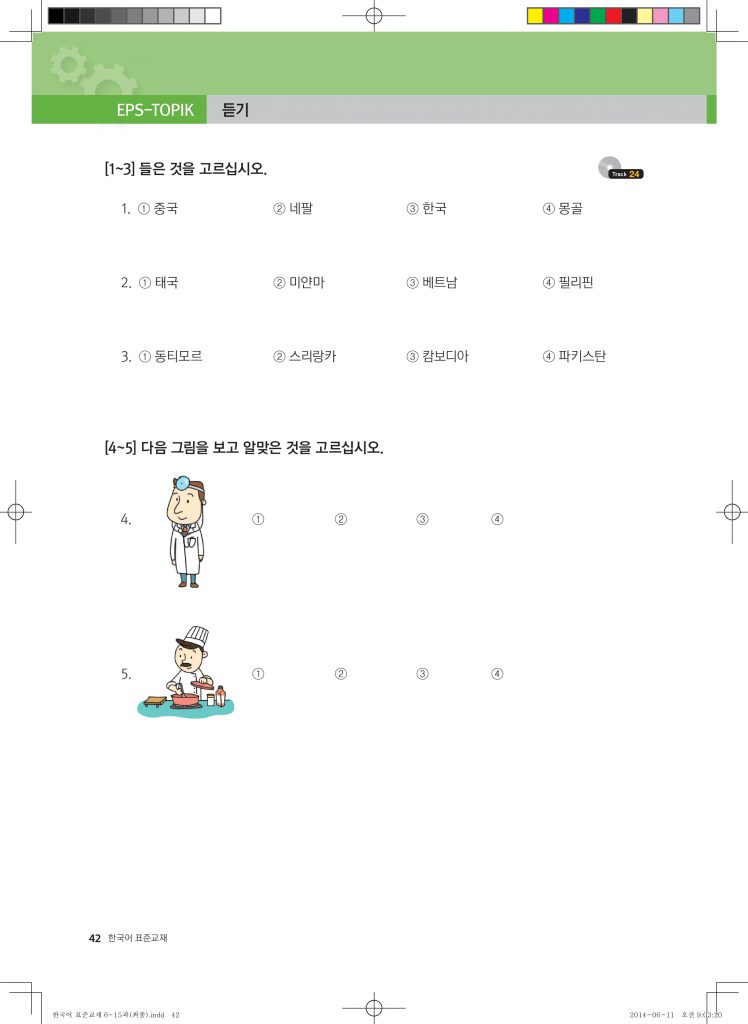
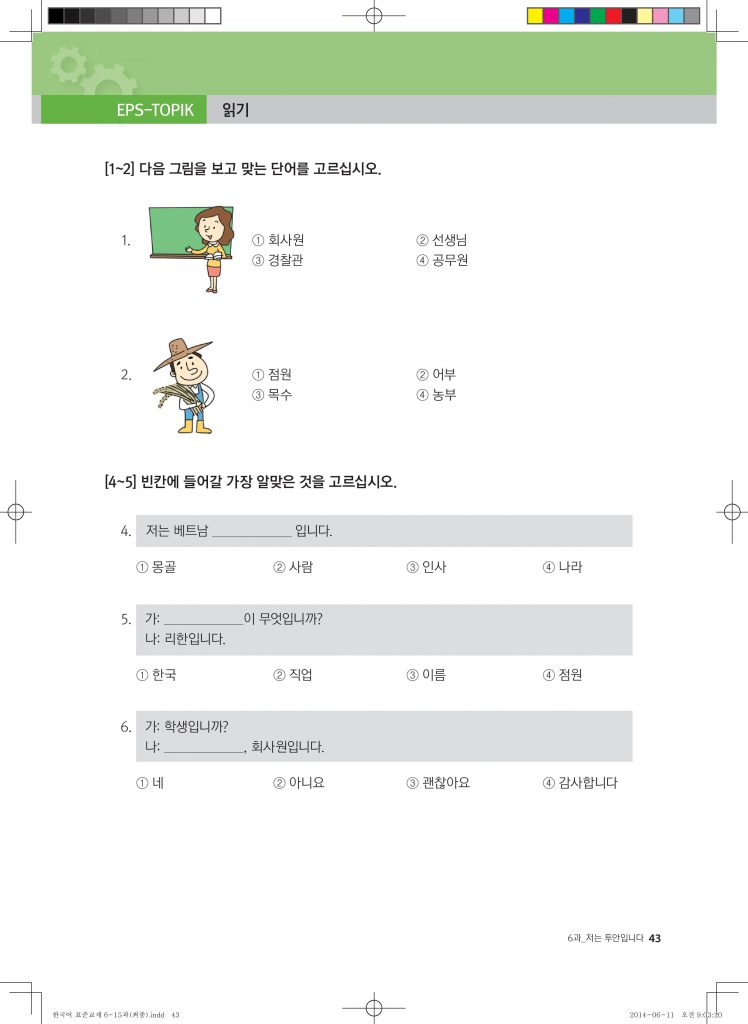
EPS-TOPIK 정답
| 듣기 | 1. ③ 2. ② 3. ① 4. ① 5. ③ |
| 읽기 | 1. ② 2. ④ 3. ② 4. ③ 5. ② |